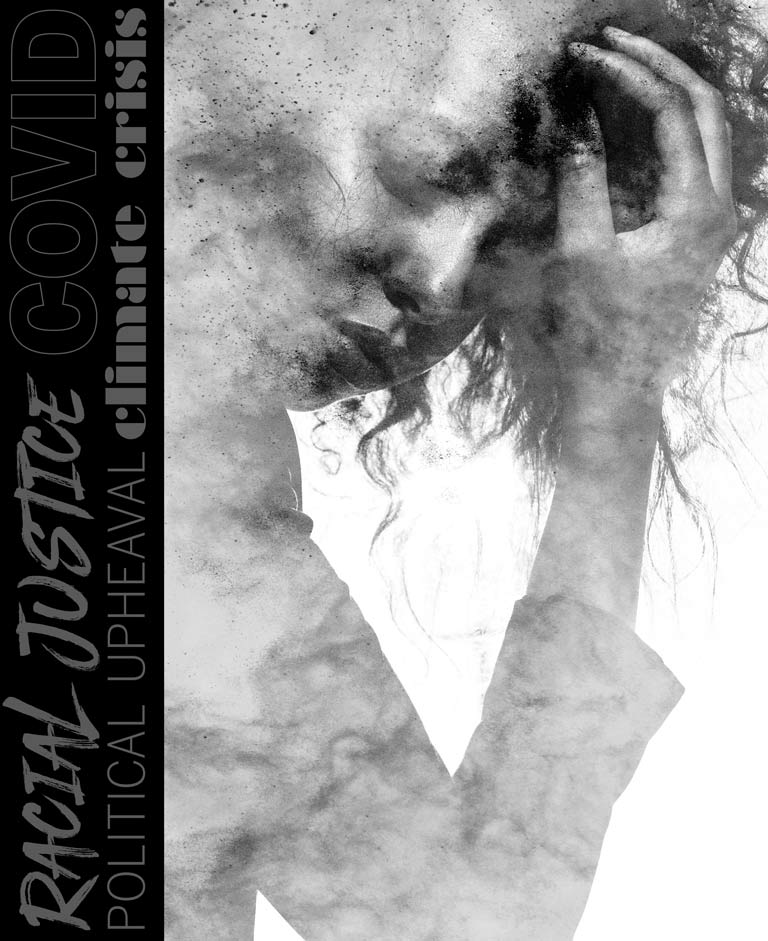Supporting IU South Bend students during these times

Attending college under normal circumstances is a challenge, especially for those who are simultaneously working to pay for tuition or support family members, as many IU South Bend students do. And attending college during a pandemic? Consider them multiplied. Students were asked to adjust to not only quickly-shifting expectations and changes to nearly every aspect of life but also navigate health, educational, and financial concerns.
“Despite the - at times overwhelming - economic issues and anxieties, I think our students have really stepped up,” said Anne Drake, director of the Office of Disability Support Services and a member of the Student Affairs and Diversity team. “They've upped their game and are doing what they need to do to be successful. We’ve asked a lot of the students, and they’ve responded. A lot of the credit goes to them.”
Staff have responded to these needs as well. When IU South Bend received $4.5 million in May from the federal CARES Act to assist students experiencing hardships caused by the pandemic, Kevin Griffith and his colleagues on the CARES Act Committee coordinated a process to distribute those dollars and respond to needs. University CARES Act allocations were divided in two: half to be distributed directly to students, half to be used by the institution for costs related to COVID-19 disruption. Griffith, who is the associate vice chancellor of Student Affairs and the executive director of the Student Counseling Center, said fall semester saw an average of 40 requests a week for needs as varied as health care, child care, rent, auto repairs, or the extra costs for studying remotely. The spring semester saw double the number of requests from last semester.
“Student financial needs are great,” he said. “The amount of money that a student could receive was initially $750. We've upped that to $1,000. We're going to up it to $1,500, because even those dollar amounts are only making a dent in many students’ needs.”
Most of the $2.25 million intended to go directly to students was automatically awarded to 3,203 students by June 9. These Emergency Financial Aid Grants of up to $900 were allotted to students who met certain federal eligibility requirements, one of which was to have a Free Application for Federal Student Aid form on file with the university. Those receiving the grant weren’t required to pay it back and it won’t impact their student financial aid packages.
Students reported that the funding was helpful and timely, addressing a variety of difficulties related to the pandemic.
Some found themselves unemployed and struggling to pay tuition and other bills. Others reported having to support family members who were struggling themselves with job loss or additional needs. Some commented that the funds lessened concern about money so they could manage to still be successful in coursework.
The Student Counseling Center wasn’t surprised to see the need for its services increase, given the hardships students face. Griffith reported that the Center had fewer no shows, with 96 percent of students keeping their appointments, and that students and staff adjusted to the telehealth environment. However, counseling requests this spring are down from last semester, a likely effect of Zoom fatigue.
As the Center explores ways to ensure it is supporting student mental health, a new grant from IU’s Office of Diversity, Equity, and Multicultural Affairs will fund a counselor for a two-year period centered on the needs of Black and LatinX students. This grant is a welcome addition in light of the recent heightened attention to racial and social justice.
“Students have told us we don’t always have a counselor who looks like a large portion of our student body,” Griffith said. The online learning environment proved to be a barrier for the more than 300 students requesting assistance from Anne Drake in Disability Support Services. “We had to rethink how we managed the majority of our student accommodations,” she said. “Hard-of-hearing students, those with learning disabilities or anxiety: they all got through it but it was a struggle.”
The Housing and Residence Life team was challenged to come up with ways to engage students, offer a welcoming atmosphere, and build a sense of community while still keeping everyone safe. As the pandemic wears on and students are “virtually Zoomed out,” staff members are working to become even more creative.
“We had 200 people attend our pumpkin patch event in the fall and we’d like to do more socially distanced, safe programming,” said Jacob Zell, residence coordinator. The university’s COVID management offered peace of mind for those few students who contracted the coronavirus as well as those who didn’t. River Crossing housing units are provided to those needing to isolate, with staff delivering three meals a day and assisting with laundry. IU’s free mitigation testing gives students (as well as staff and faculty) reassurance, and the recently expanded evening hours of operation increased availability for students needing flexibility.
As the pandemic enters its second year, the likelihood of students needing help will continue.
IUSB offers support via the campus food pantry, Emergency Relief scholarships, Titans Mentoring Titans peer mentoring program, and even in the form of faculty members sending handwritten notes to first-year students during midterms. Now is the moment when the heartwarming personal touch afforded students at a regional campus like IUSB makes all the difference.

